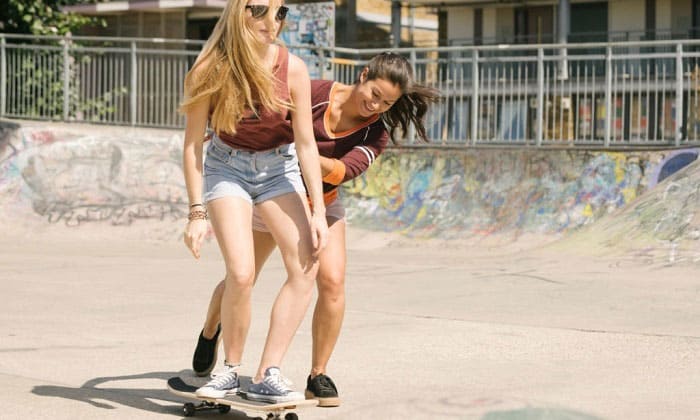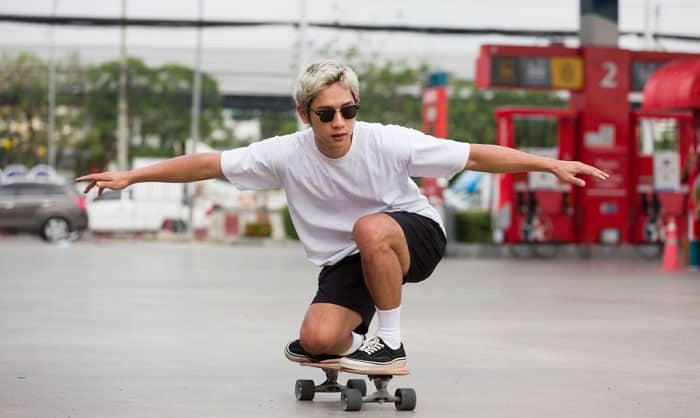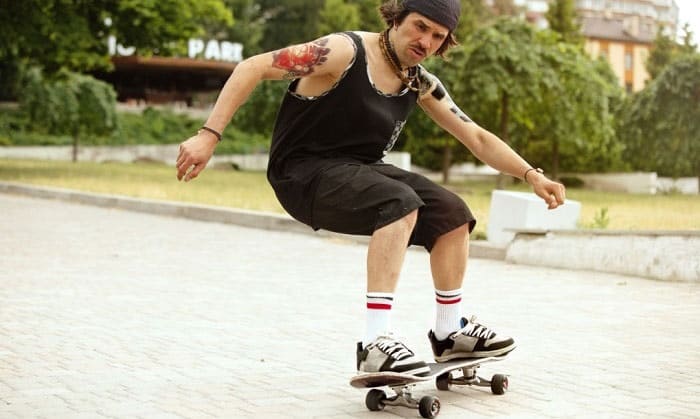After a certain point, most skateboarders cease improving. It seems as though you are getting worse rather than getting better. To improve your skill in skateboarding, the basics matter in how to get more comfortable on a skateboard.
Taking a video of yourself while applying your technique in skateboarding might also help you assess your improvement. Also, be open to acquiring criticisms from experienced skateboarders.
Table of Contents
What Will You Need
Do you like skating, but you’re frightened of losing control? If this is the case, it’s time to conquer your anxiety! Besides, skateboarding is an excellent type of physical workout. Depending on your preference, you may learn the fundamentals of tricks and skills on a skateboard. To have fun yet have a safe experience, it’s essential to have safety equipment that is listed below:
- Helmet and Kneepads – Skateboarding is a high-risk sport, and accidents are sure to happen. Wearing a helmet as you learn to balance and roll on flat surfaces is a wise safety precaution. Knee pads and helmets are required equipment for professional athletes. Additionally, it will boost your self-esteem.
- Skateboard – If you’re new to skateboarding, picking a nice board might be difficult. In addition to the price, you must consider the whole board, including the deck, trucks, and wheels.
- Decent Pair of Sneakers – If you plan on doing any regular skateboarding, you must wear proper shoes. If you want the best experience possible, you should wear skateboarding-specific shoes.
Read more: The difference between skate shoes and sneakers and why you need to pick the right skate shoe here!
8 Amazing Tips to Get More Comfortable on a Skateboard
Just like any other talent, with proper discipline and patience to learn, each of us can learn skateboarding. All that it takes is the day after day practice.
Skateboarding Tips to get comfortable on a skateboard:
Here are some tips to consider to get better at riding a skateboard:
- Practice the basics.
Everyone has to start from the basics. You should learn to lean and cave, noting how you feel when standing on the skateboard and starting basic tricks.
- While still standing, make a new movement.
Once you have tried moving the board while standing on it, try moving it again in a different direction. By doing this, with some practice, you’ll have a better understanding of what position you’re most comfortable with at first. Additionally, you’ll learn how to fine-tune your weight shifting.
- A relaxed posture.
The footing technique is critical while skating since it helps to keep you in balance and get better board control on a skateboard. To begin with, you must choose which position is the most adaptable for you. You’ll become more adept at the position if you practice it often.
- Use your heels and toes.
Another technique for improving your skating flexibility is turning the board with your toes and heels. While riding on the skateboard, all you have to do is shift your weight from one side to another.
- Use a Level Area for Your Practice
Practicing on level ground for the first few sessions is highly recommended. It’ll teach you how to maintain your balance on the skateboard and use the brakes effectively. Simply place one foot on the board and the other on solid ground, and then push yourself forward.
- Skateboards and shoes should be of high quality.
Regular skateboarding requires high-quality sneakers. You must use skateboarding-specific shoes to have the best possible experience. Also, I recommend you learn more about how to lace skateboard shoes for the most comfortable.
- Everything begins with a delicate balance.
Skateboarding requires a strong sense of balance to advance. Once you’ve figured it out, your abilities will skyrocket. There are several tricks to improve your balance. Put a bottle of water and place it on top of your deck. Start leaning forward, backward, sideways, and so on, avoiding the bottle from falling off.
- Take advice from others.
An excellent way to improve your skateboarding skills is to go skating with friends or a website community, like Reddit at the very least, or any other folks you like hanging out with.
Let go of your ego and use their comments to achieve your advantage. Don’t be scared to seek help; skateboarders are happy to share their knowledge with anybody modest enough to ask. All skaters are aware of the fact that they were all beginners once before.
Are You a Beginner? How Long Will It Take to Learn to Skateboard
If you wanted to, you could probably learn how to skateboard in one day. You need to be able to get the bare essentials down within an hour, but it might be kind of uncomfortable. Don’t give up if it takes you a while to become proficient at skateboarding.
To grow and improve one’s skateboarding abilities is a lifetime quest. Skateboarding has the advantage of allowing you to learn at your speed while still seeing results. It’s a worthwhile endeavor.
In 60 minutes, you were able to grasp the fundamentals of skateboarding. The most important thing is you have now learned how to ride a skateboard. Commit yourself to it to make it better in the future.
The time it takes to master the fundamentals is determined by how frequently and how much you practice them. The more time and effort you put into anything, the greater the outcome it offers. Spending 30 minutes of skating every day will help you improve faster than skating for 5 hours a week.
Conclusion
After undergoing proper and sufficient training, you will realize that skateboarding is a mix of posture, speed, and flexibility. Skateboarders of all skill levels, including yourself, must be cautious while doing necessary and suggested skateboarding tricks.
You must, however, adhere to skating regulations to be safe on the road. If you’re going to skate in any location, including on a busy street, make sure you’re adequately protected with a helmet and other safety gear.
Please consider sharing this article if you learn how to get more comfortable on a skateboard. Happy Skating!

Hi, I am Charles Harris. I opened this site to write as much as I can about my biggest passion – skateboarding!
I started as a clumsy yet passionate rookie 10 years ago to now a still passionate yet much better skateboarder! But I have to tell you, the whole journey has always been fun and rewarding, indeed not without hardship.




